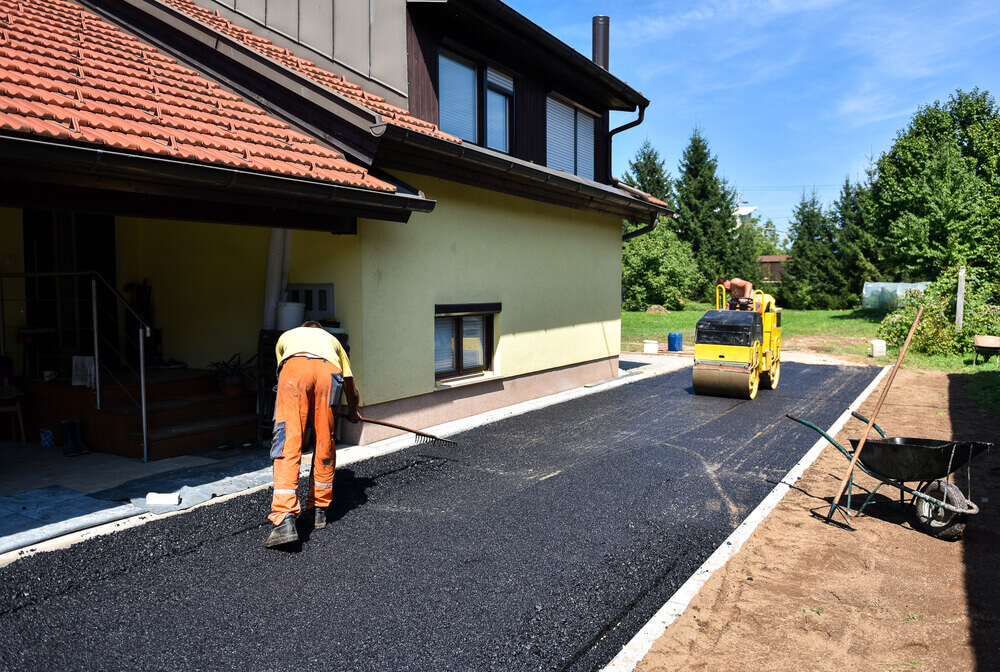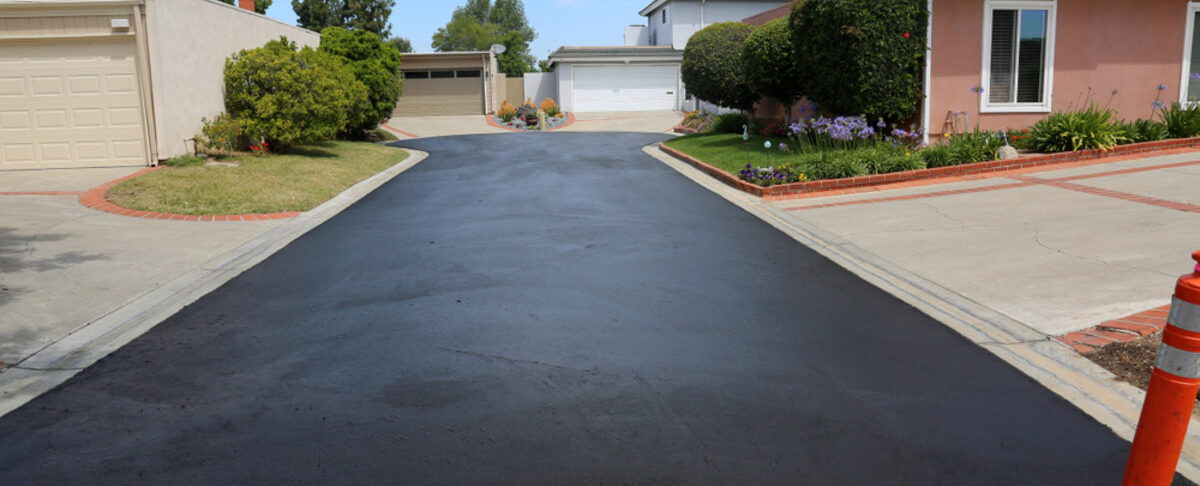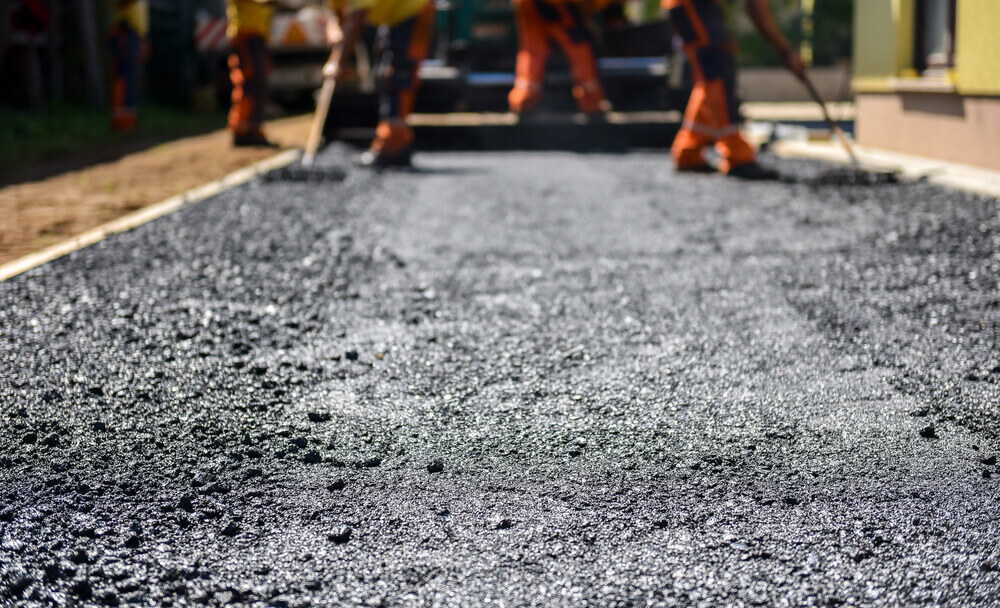When it comes to choosing the right material for your driveway, asphalt is often a popular choice among homeowners. It offers a range of benefits that make it an attractive option. However, it’s important to consider the pros and cons before making a decision. In this article, we will explore the advantages and disadvantages of using asphalt for your driveway, as well as the differences between asphalt and concrete, so you can make an informed choice for your home.
What Is Asphalt?
Before we delve into the pros and cons, let’s first understand what asphalt is. Asphalt is a material made up of asphalt cement and aggregate materials such as sand or stone. It is commonly used for constructing driveways, roads, and parking lots. Asphalt is known for its durability and flexibility, making it capable of withstanding heavy traffic and varying weather conditions.
Pros of Using Asphalt for Your Driveway
Here are the pros of choosing asphalt for your home’s driveway:
Cost-Effective
One of the major advantages of using asphalt for your driveway is its affordability. Compared to concrete driveways, asphalt driveways are generally more cost-effective, making them a popular choice among homeowners. The installation cost of asphalt is lower, and it requires less maintenance over time. This makes it a great option for those on a budget.
Durability
Asphalt driveways are known for their durability. When properly installed and maintained, an asphalt driveway can last for many years. It can withstand heavy loads and is less susceptible to cracking compared to concrete driveways. This durability ensures that your driveway will continue to serve you well for a long time.
Easy Maintenance and Repairs
Maintaining an asphalt driveway is relatively simple. Regular cleaning with a broom and hose to remove dirt and debris is usually sufficient. Additionally, any cracks or fissures that appear can be easily repaired using cold patch material or hot asphalt. This ease of maintenance ensures that your driveway remains in good condition with minimal effort.
Quick Installation
Another advantage of using asphalt for your driveway is the quick installation process. Unlike concrete driveways, which require a longer curing time, an asphalt driveway can be used immediately after installation. This means you can start enjoying your new driveway without having to wait for an extended period.
Versatility
Asphalt driveways are versatile and can complement various architectural styles. Whether your home has a modern or traditional design, an asphalt driveway can seamlessly blend in and enhance its overall aesthetic appeal. This versatility allows homeowners to choose asphalt with confidence, knowing that it will complement their home’s exterior.
Cons of Using Asphalt for Your Driveway
Now that you know the pros of asphalt driveways, there are downfalls to consider:
Shorter Lifespan
While asphalt driveways are durable, they have a shorter lifespan compared to concrete driveways. On average, an asphalt driveway can last between 12 to 20 years. Factors such as climate, maintenance, and usage can affect the lifespan of the driveway. Regular maintenance, including sealing and repairs, can help extend its lifespan.
Susceptibility to Temperature Changes
Asphalt driveways can be affected by extreme temperature changes. In hot climates, the dark color of asphalt absorbs heat, making the surface hot to the touch. This can be uncomfortable for pedestrians and pets. In colder climates, asphalt can contract and expand with temperature fluctuations, potentially leading to cracks and other damage.
Limited Customization Options
Unlike concrete, which offers a wide range of customization options, asphalt driveways have limited design choices. The dark color and smooth surface of asphalt may not provide the same level of design flexibility as concrete. If you are looking for a highly customized or unique driveway, asphalt may not be the best choice.
Regular Maintenance Required
To ensure the longevity of your asphalt driveway, regular maintenance is necessary. This includes sealing the surface every 2 to 5 years to protect it from UV damage and water penetration. Additionally, any cracks or potholes should be promptly repaired to prevent further deterioration. Regular maintenance can be time-consuming and may require professional assistance.
Asphalt vs. Concrete Driveways
Now that we have explored the pros and cons of using asphalt for your driveway let’s compare it to concrete to help you make an informed decision.
Cost
In terms of cost, asphalt driveways are generally more affordable compared to concrete driveways. The initial installation cost of asphalt is lower, and ongoing maintenance expenses are typically less. However, it’s essential to consider long-term costs and the specific requirements of your project when making a decision.
Durability
Both asphalt and concrete driveways are durable, but concrete driveways tend to have a longer lifespan. Concrete driveways can last for 20 to 50 years or more with proper maintenance, while asphalt driveways typically last between 12 to 20 years. Consider your long-term goals and budget when deciding which material is best for your driveway.
Maintenance
Maintaining both asphalt and concrete driveways is crucial for their longevity. Asphalt driveways require regular sealing and repairs to prevent cracks and potholes. Concrete driveways may require occasional sealing and repairs as well. Consider your willingness to invest time and effort into maintenance when choosing between the two materials.
Climate Considerations
Climate plays a significant role in determining the longevity and performance of your driveway. In hot climates, asphalt driveways can become hot to the touch and may require additional measures to mitigate heat absorption. In colder climates, concrete driveways may be more suitable, as they are less prone to cracking from freeze-thaw cycles. Consider your local climate when deciding on the right material for your driveway.
Customization
If customization is a priority, concrete driveways offer more design options compared to asphalt driveways. Concrete can be stained, stamped, engraved, or tinted to achieve the desired aesthetic. Asphalt driveways, on the other hand, have limited customization options. Consider your desired level of customization when selecting a material for your driveway.
Choosing a Reputable Asphalt Contractor

When installing an asphalt driveway, it’s crucial to choose a reputable asphalt contractor to ensure quality installation and excellent customer service. Working with professionals like Richfield Blacktop can provide peace of mind, knowing that your driveway will be installed correctly and meet your expectations. Contact Richfield Blacktop today to get a free quote on an asphalt driveway.





